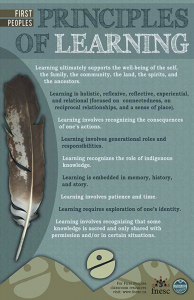
When I think of how important it is for us as educators to include Indigenous knowledge’s and perspectives, I am grateful for the First Peoples Principles of Learning. These principles were created to share Indigenous values and perspectives on both teaching and learning. I believe that these values are best exemplified in the first principle of learning which states: “learning ultimately supports the well-being of the self, the family, the community, the land, the spirits, and the ancestors”. For me, it is very important that this is the first principle because it shows how important well-being and relationships. This principle really resonates with me as I believe that relationships should be at the forefront of our teaching to help support the well-being of our students.
These principles also include important life skills and connect well with the core competencies. I like how in these Indigenous values, they are focused on giving students the skills to thrive in aspects of their lives, not just in curriculum based subject areas. Social emotional learning is equally as important as curriculum content and it is important to me that these principles of learning.
I would also like to mention that these principles are a wonderful starting point but as educators, we need to be doing more to include Indigenous content into our classrooms. These principles are meant to guide our teaching and give us perspective when informing our students. Another important aspect of these principles is actually stated in principle 9, which states “learning involves recognizing that some knowledge is scared and only shared with permission and/or in certain situations”. For me, part of this principle means that as educators, we need to recognize how there is some knowledge that is best learned from Knowledge-Keepers and Elders. Even when we want best teach our students, we need to realize when it might be important to bring in someone who has the privilege to hold and share that knowledge.
In my teaching approaches, learning needs to me interconnected and meaningful and it is important to me that these principles of learning reflect that.
A few links to start with or refer to:
First Peoples Principles of Learning – Poster – from FNESC
http://www.fnesc.ca/wp/wp-content/uploads/2015/09/PUB-LFP-POSTER-Principles-of-Learning-First-Peoples-poster-11×17.pdf
First Peoples Principles of Learning – Blog – by Jo Chrona from FNESC
https://firstpeoplesprinciplesoflearning.wordpress.com/
Learning First Peoples Classroom Resources – from FNESC
http://www.fnesc.ca/learningfirstpeoples/
